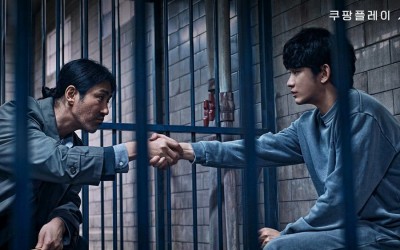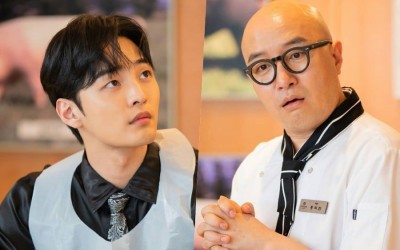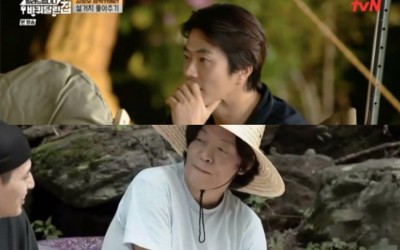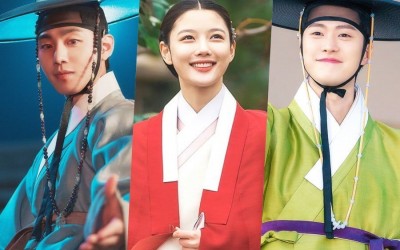An honest review of Netflix's 'Squid Game'
Over the past weekend, on the 17th of September 2021, Netflix released its highly anticipated original series 'Squid Game.' Starring absolute gems of the Korean acting industry, Lee Jung Jae and Park HaeSoo, 'Squid Game' sets up a deathly premise revolving around children's games and human desperation. Here is my honest review of the series on everyone's watchlist.
[Spoilers Ahead!]
[C/W Content Warning: Death, suicide.]
Right off the bat, the overarching concepts of 'Squid Game' are not something brand new. The rich and powerful make pawns of the poor for their perverted delight in a game of life and mostly death. We've seen similar themes in Western narratives such as 'The Hunger Games' and 'Maze Runner' as well as Eastern ones such as 'Alice in Borderland,' 'Battle Royale' and 'Kaiji.' However, what sets 'Squid Game' apart is Han.

To explain further, I'm citing a quote from Suh Nam Dong, a Minjung Theologian who describes Han as “A feeling of unresolved resentment against injustices suffered, a sense of helplessness because of the overwhelming odds against one, a feeling of acute pain in one’s guts and bowels, making the whole body writhe and squirm, and an obstinate urge to take revenge and to right the wrong—all these combined.” This is an inherently Korean sentiment, born of the shared experiences of thousands who suffered under the Japanese occupation of Korea. To say Han is simply resentment and sorrow, however, would be a disservice to the depth of the nation's collective consciousness and innumerable other interpretations of the same. While some associate it with anger, others link it with hope. Han is a feeling that nothing/no one can infringe upon, and it is this feeling that forms the foundation of the 'Squid Game.'

As viewers with no clear understanding of such sensibilities (unless, of course, you're Korean), 'Squid Game' takes us on an unbelievable journey just to give us a glimpse into the real world through the foggy lens of some very unreal, unexplained circumstances. However, that is not to say that the narrative of 'Squid Game' does not ring true universally. The very human melodrama at the center of the plot could not have been more ubiquitous. With immensely pleasant (albeit frightening) cameos from Gong Yoo and Lee Byung Hun, 'Squid Game' is an inimitable masterpiece, but it is hard to deny that it takes its own assertion a bit too far, almost missing the mark.

The devastatingly horrifying situation our characters are thrown into when they give in to their desperation for financial improvement feels unfair and inhuman. They have nothing to lose in the world and are too filled with resentment to have a clear sense of life. However, when they jump into the same ring once again, apparently of their own volition, a natural reaction is to withdraw sympathy. However, that doesn't last long when we're taken behind the scenes. We're made to equate the cruelty of the world to the death trap of the "Game," once again justifying the suicide mission of hundreds of "players." We can't help but root for the players, especially our main characters, since we know them better.

Seong Gi Hun (Lee Jung Jae) is a father and a son who's barely holding on to both of these relationships. Cho Sang Woo (Park Hae Soo) has lost all his own money as well as his company's and his mother's despite having a bright start to his life. Now he has creditors and the police out for him, waiting to hunt him down in the outside world. To Sang Woo, the Game is not just his final hope; it is also shelter.

Kang Sae Byeok (Jung Ho Yeon) is a North Korean defector who needs an unimaginable amount of money to be able to safely bring her mother to South Korea from North Korea and give her little brother a good life. With such tragic stories building their spines, a survival game doesn't sound half bad to them.

Over 6 children's games, 456 players bet their lives with hopes for a fresh start, which soon turns into murderous intent, quite predictably so. The games that they're forced to play are carefully chosen and brilliantly transformed. The first five episodes flow beautifully, almost like a novel. Your breath is hitched, and you're barely blinking as you pray for your favorite characters to make it. With high hopes, you expect the players to figure out a way to beat the Game. However, that never happens, and the second half is when the series starts to feel a little too long. The violence and gore continue with no way to turn things around.

Even an undercover policeman, Hwang Jun Ho, played incomparably by Wi Ha Joon, seems to be able to do close to nothing to stop the mass murder these players have signed up for. We never found out what the disgusting VIP said to Jun Ho or whether he was even able to send the information through to the relevant authorities. Admittedly, there wasn't much he could do in the first place, from an island in the middle of nowhere, without risking death. He had no clear plans and no backup in case of emergencies. He doesn't even notify his team to look for him in case he's gone for too long. Instead, he's driven solely by his fraternal pull, and it doesn't come as much of a surprise when we later find out that his brother was actually the Front Man all along.

Not only is Jun Ho shot by his own brother at the edge of a cliff, but we're also left hanging without an iota of an explanation. It is understandable that this is building up to the eventual second season, but it takes away from the virtue of the first season, which should have been able to stand alone in its own right without leaving too many questions unanswered or, even worse, terribly answered. For instance, the revelation of the old man Oh Il Nam (Oh Young Soo) being the psychopathic mastermind behind what is essentially a genocide is rather unsatisfactory. It only serves as a plot device to heighten shock value. His reasoning isn't impactful enough, but more importantly, it cheapens the Game a bit too much. He advocates for "a fair world," and yet, knowing that he wouldn't be killed, he allows Seong Gi Hun to win even when he would have clearly lost.

Despite the old man's passing, the Game must go on. So, who makes the rules now that the puppetmaster is gone? Does Seong Gi Hun make the right decision when he chooses to go back in and expose the Game? He could have taken this stance the second time around itself because evidently, he doesn't learn much from going through all 6 games that he didn't know after the first one itself. His hands are just as stained with blood as anyone else's. Through participating in yet another bloodbath, will he really be able to devise a solution to end it all for good? As a matter of fact, it would be way more effective to work from the outside in this time instead of the other way around, especially with the knowledge of the man behind the curtain. In addition, we never find out why Hwang In Ho is the Front Man and why it was vital that we know that he was the winner of a previous Game. It would have naturally implied that winners have to assume the position of the Front Man and are stuck in this loop, but since that doesn't seem to be the case, a darker mystery must linger behind the Front Man.

The series does little justice to the incredible characters it prefaces in the first half, and it is a pity that the entire first season will simply act as a setup for the second season. Either way, 'Squid Game' is ingeniously written and flawlessly brought to our screens by some of the most phenomenal actors in the Korean entertainment industry. No words are enough to describe the mastery of Lee Jung Jae and Park Hae Soo. In addition, 'Squid Game' is model Jung Ho Yeon's acting debut, but her performance is as refined as that of a veteran actor. Wi Ha Joon gave me goosebumps with his character, and the way he executed every element of the same was remarkable, to say the least. Knowing that he wasn't shot in a vital organ, I'm desperately hoping that he returns for the second season. Ultimately, there could not have been a more fitting cast for this series, and we cannot wait to see how the second season will bring us the conclusion we're left waiting for.
Source: allkpop
Other Articles
-

tvN Variety Show “Unexpected Business” In Talks To Launch 2nd Season
-

Ji Hyun Woo, Lee Se Hee, Park Ha Na, And More Introduce Their New KBS Drama “Young Lady And Gentleman”
-

Kim Min Jae And Park Gyu Young Experience A Shocking Incident At A Party In “Dali And Cocky Prince”
-

[PICK] Korean Romance Movies to Be Released in the Latter Half of 2021 & 2022
-

Director Of Kim Soo Hyun And Cha Seung Won’s New Drama Praises Their Acting + Shares What To Look Forward To
-

‘Hometown Cha-Cha-Cha’ Shin Min Ah and Kim Seon Ho Confirm Their Feelings for Each Other
-

Hong Suk Chun To Make Special Appearance Opposite Kim Min Jae In “Dali And Cocky Prince”
-

“High Class” Ratings Dip To All-Time Low Amid Chuseok Holiday
-

Park Gyu Young And Kim Min Jae Act Like A Couple In Front Of Kwon Yool In “Dali And Cocky Prince”
-

Kwon Sang Woo And Park Ji Hwan Talk About The Hardships Of Playing Villains In “House On Wheels” Spin-Off
-

Jo Yeo Jeong Refuses To Be Intimidated By The Other Mothers In “High Class”
-

Ahn Hyo Seop, Kim Yoo Jung, And Gong Myung Radiate In Their Hanbok On Set Of “Lovers Of The Red Sky” + Share Chuseok Greeting
Genres
- Accident
- Action
- Adventure
- Alien
- Amnesia
- Ancient legend
- Animals
- Animation
- Arthouse
- Artificial Intelligence
- Award Winning
- Based on a Comic
- Based on True Story
- Betrayal
- Biography
- BL
- Bodyguard
- Bromance
- Business
- Chambara
- Childhood
- Christmas
- Cohabitation
- Cold Man
- Coma
- Comedy
- Concert
- Conglomerate
- Conspiracy
- Contract Relationship
- Corruption
- Crime
- Criminal
- Curse
- Dance
- Deity
- Demon
- Detective
- Disability
- Disaster
- Documentary
- Drama
- Eastern
- Educational
- Entertainment
- Environment
- Erotica
- Espionage
- Exorcism
- Exploitation
- Fairy
- Family
- Fantasy
- Fashion
- Feminism
- Food
- Foreign
- Friendship
- Game Developer
- Gangster
- Geishas
- Gore
- Goryeo Dynasty
- Grudge
- Gumiho
- Harem
- Hidden Identity
- Historical
- Horror
- Hostage
- Human
- Hypnotism
- Idol Drama
- Indie
- Instructional
- Investigation
- Jidai Geki
- Josei
- Kidnapping
- Kung Fu
- Law
- legal
- Lesbian
- LGBTQ+
- life
- Love Triangle
- Mafia
- Magic
- Manga
- Manhua
- Martial Arts
- Mature
- Medical
- melodrama
- Mermaid
- Military
- Miniseries
- Misunderstanding
- Monster
- Murder
- Music
- Musical
- Mystery
- Mythology
- Nature
- Neighbours
- Noir
- Novel
- Omnibus
- One shot
- Parody
- Phobia
- Poison
- police
- political
- Power Struggle
- Prison
- Professional
- Programmer
- psychiatry
- Psychological
- Reality
- Reality Show
- Reality TV
- Rebellion
- Religion
- Remake
- Republic
- Resurrection
- Revenge
- Rich Man
- Robot
- Romance
- RPG
- Rural
- Samurai
- Scholar
- School
- Sci-fi
- Seinen
- Serial Killer
- Short
- Sismance
- Sitcom
- Slapstick
- Slice of Life
- Society
- Soulmates
- Sports
- Supernatural
- Survival
- Suspense
- Swordsman
- Taiga drama
- Teamwork
- Tearjerker
- Teen
- Terrorist
- Thief
- Thriller
- Time Travel
- Tokusatsu
- Tomboy
- Tragedy
- Tragic Past
- Transmigration
- Trauma
- Treason
- Triad
- Underworld
- Unrequited Love
- urban drama
- Vampire
- Variety
- Variety show
- War
- Warrior
- Web Series
- Webtoon
- Werewolf
- Western
- Witch
- Workplace
- Wuxia
- Yakuza
- Yaoi
- Youth
- Yuri
- Zombie

